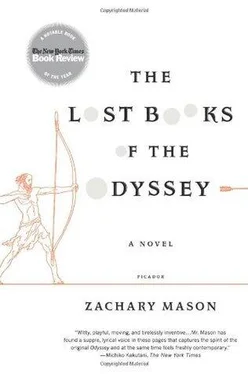Her father Tyndareus had been in a quandary, as he had just the one daughter but could not afford to offend the many princes who must necessarily go home bachelors. He had therefore abdicated the decision to the goddess, and, to forestall future problems, had made each suitor swear that, should Helen be kidnapped, he would go to war to help recover her. As the suitors assembled on the temple steps, a white heifer was led out of the coolness of the shrine and stood blinking in the sun. Tyndareus said, “The groom will be the one closest to the victim,” and cut the beast’s throat. Odysseus, who was devoted to Quickness and confident of his chances, peered into the shadowy precincts of the temple and saw the idol smile at him with pity and affection and then turn her gaze toward Menelaus. The cow hesitated, then took a few tottering steps toward Menelaus and collapsed at his feet, wetting his thighs with her blood, and the suitors felt that there was a stranger among them. Helen laughed delightedly, either at the death or their dismay, and in the clarity of disappointment Odysseus realized that this was the first time he had seen her show emotion. It also occurred to him that however close Menelaus had been to the dying animal, Death was closer.
Menelaus took Helen back with him to Sparta but there was no peace in his victory because as soon as he was home the dreams began. Every night he dreamed he flew in lazy circles high over a dark place where he knew there was but could not see a city. Scattered points of light appeared, moving inward. He flew lower and the lights became torches in the hands of soldiers and then the city started burning, the army swarming in over the walls like sparks flowing back into a fire. He lost sight of the soldiers in the thickening smoke and tried to go lower. Then the wind changed and he was on the ground again and the soldiers lay dead around him, their bodies already stiff and pale though they showed no outward wounds. He walked among the bodies for a while and then he was on the walls of the now silent polis. Looking down (he knew he should not but could not help himself), he saw that the walls descended into the earth endlessly, vertiginously, layer upon layer of cold stone stretching down into darkness forever.
Every night he woke from this dream weeping but dried his tears before Helen could see them. Ashamed, he swore never to be afraid of mortal men or of the gods or even of death. As his wedding day receded into the past the dream faded but his resolve did not. He acquired the habit of smothering his fear with reckless bravado — he dove deeper than his friends in the coastal seas, rode breakneck over rough hills and more than once went first over an enemy wall, made so fast by terror that no spear or sword could touch him. By the time he was twenty *he believed he had conquered fear and valued himself highly for it. It was pride in his courage that made him open his gates to King Death, who, though famous for his hospitality, was used to getting none in return.
Death, who in those parts most often went by the name Paris, was a tall pale man with colorless eyes and flaxen hair. At first glance he looked like a thirty-year-old who had never been in the sun but the translucence of his skin, the formality of his bearing and the perfect blankness of his eyes made him upon consideration seem older, and older, and finally as old as night. He showed up at the palace gates without any retainers, clad in old black armor, knocking rhythmically and loud. The porter demanded his name and country and got a quiet answer. He went trembling to Menelaus and told him who had come. Menelaus did not hesitate, though he became very grim, and went out through the now empty courtyard to admit his guest.
Death must have been unaccustomed to a guest’s portion but he played his part with courtesy. When the wine came, he poured a libation to Zeus the All-Father, who some said was his brother, saluted Menelaus and his knights and bowed to Helen, whose radiance seemed to light up the dark and smoky hall, though it and she were tolerably cold. As courtesy required, Menelaus spoke first of his own affairs, but when the wine was down to the dregs he asked the pale man how things did in his kingdom. Death said that though he was the ruler of but a single city he had many subjects and none had yet complained for want of room. He spoke of vast, heavy silence, of shadows moving over fields of asphodel, of the somnolent trickling of the waters of Hell, of the company of the august dead — Minos the judge, wise in all things, bluff Orion hunting the spirits of animals through the endless gloaming, and the mortal part of Hercules standing in the River Styx and looking pensively toward Mount Olympus, where his immortal twin disported himself among the gods. Finally Death said that for all he was master of shadows he had of late begun to pine for brightness, and with a sidelong glance at Helen rose and went away to his room.
That night Menelaus lay uneasily next to Helen. He dreamed that Death came into their chamber like winter. Death’s eyes were cold and bright, his breath was frost, his armor was the void and now there was no mistaking him for a man. Death leaned over Helen and whispered in her ear. Menelaus could not quite make out what he said but his mind was full of dead suns, ancient cities made of ice, cold still things, quiet and thoughtful, on the edge of slipping into nothing. Of falling forever. Death drew her up out of bed and pulled her face into his chest and the dream faded.
In the morning Helen was gone and so was his guest — not only that but the wine he had drunk was spilled on the flags of the banquet hall and his meat lay on the bench unchewed, the dogs shunning it. Menelaus strapped on his sword and rode to see Agamemnon, now the High King, to tell him he meant to bring war to Death’s city.
Menelaus and Agamemnon invoked the betrothal oath and called up all the men who owed them service. They told their recruits only that Helen was gone and that they were making war on a great king in the East to get her back. The most intractable and desirable recruit was Odysseus, who had in the years since the wedding kept to Ithaca, his island kingdom, and spent his days in contemplation in Quickness’s shrine.
Menelaus went to Ithaca, found Odysseus at prayer and demanded that he arm himself and come with him. Without getting up, Odysseus observed that he was indifferent to Menelaus’s domestic problems and that in light of Menelaus’s bad breeding Helen had probably left of her own accord, thereby negating the compact. Menelaus, implacable, said that he would bind Odysseus and bring him as a slave if not as a companion. Odysseus invited him to try and blood was in the air when on impulse Menelaus told him the name of the personage with whom he quarreled. Odysseus hesitated, glanced at his altar, sighed and said, “Your enemy is a terrible one but it seems I must go with you,” and took his spear down from the wall.
They left Ithaca on a mirror-clear night, the ships sweeping through black water and reflected stars. Soon the dark hulls ground on the sands of Ilium, Death’s country, the white sails were furled, and they leapt down onto the shingle with weapons in hand. The sand crackled underfoot — Odysseus scooped up a handful and saw that it was made up of ground bone, tiny fragments of tooth, skull and vertebrae. They pitched their tents on the shore in the shadow of Ilium’s tall jagged walls and the odor of the charnel smoke rising from its towers. The augurs stared forlornly at the birdless sky.
The next morning the Greeks mustered to attack. As they drew near Ilium’s massive gate and spike-surmounted walls they wavered, even Agamemnon hesitating, but Menelaus was indifferent both to his men and to terror and he led the way, eyes shining, without looking back to see if they followed. Passing the black tree growing before the gate of Ilium, Menelaus struck the gate three times with the pommel of his bronze sword.
Читать дальше












